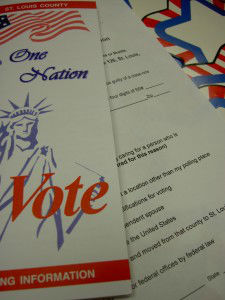The case of Harrison Board of Education v. Netchert, which was recently approved for publication, presented what the court deemed an “interesting conundrum”: whether a referendum question that plaintiff concedes has no actual legal effect on the relationship between the parties nonetheless should be barred. The court ultimately answered no.
The Facts of the Case
The Town of Harrison Board of Education (“Harrison BOE”) filed a verified complaint in lieu of prerogative writs seeking an order restraining defendant Barbara Netchert (“Netchert”), in her capacity as Hudson County Clerk, from printing a nonbinding referendum question submitted by the Borough of East Newark’s Mayor (“East Newark”),on the ballot for the general election in November 2014. The ballot question read: “Should East Newark High School students be sent to Kearny High School instead of Harrison High School?”
For over 100 years, East Newark, which has no high school, has been in a sending-receiving relationship with the Harrison BOE. Over the past several years, the East Newark BOE has expressed a desire to terminate the arrangement. However, the Harrison BOE has refused to do so unless the East Newark BOE follows the legally required procedure under N.J.S.A. 18A:38-13 for terminating the relationship, which requires that the East Newark BOE submit an application and feasibility study to the Commissioner of Education for approval.
In its suit, the Harrison BOE maintained that the referendum question was patently invalid because the East Newark Mayor had no authority to submit a nonbinding referendum question relating to the internal affairs of the East Newark BOE, a separate and distinct governing body. East Newark rejected the challenge to its authority and raised a number of other defenses, which included: (1) the plaintiff’s failure to show that the Borough acted in an arbitrary, capricious, or unreasonable manner; (2) lack of standing; (3) it is time-barred by Rule 4:69-6(a) because the suit brought later than forty-five days after the accrual of the claim.
The Court’s Decision
The court ultimately concluded that the nonbinding referendum question was proper, but that the proposed accompanying interpretive statement must be stricken because it was prepared by the Borough Clerk and was not approved by resolution of Harrison’s municipal counsel.
With regard to standing, the court agreed with the Harrison BOE that it had standing to challenge the referendum because its claim implicates issues of considerable public interest and importance. “As the current receiving district of East Newark high school students, the Harrison BOE has an interest in a legal and lawful vote on the nonbinding referendum asking voters whether the send-receive relationship should be terminated. The Harrison BOE is neither a mere interloper nor an intermeddler in this dispute,” the court explained.
The court also concluded the complaint was not untimely. According to the court, the “case presents issues of significant public importance relating to the legality, under N.J.S.A. 19:37-1, of East Newark’s efforts to place a referendum question on the ballot.” Accordingly, it held that, even if the forty-five day accrual period had passed, this case presented issues of public interest significant enough to warrant an enlargement of the period.
Despite confirming the Harrison BOE’s ability to challenge the referendum, the court ultimately concluded that the nonbinding referendum question could proceed, absent the interpretative statement. As explained in the opinion:
East Newark is not seeking legislation outside the scope of its affairs; it merely seeks to determine its citizens’ sentiments in respect of where its students attend high school, a factor that unquestionably will influence the appropriation determinations it makes when the Board of School Estimate next meets. Given its fiscal responsibilities, and the impact of the choice of high school on the budget, this issue clearly is one of fiscal importance to the Board of School Estimate and, by association, the municipality. East Newark has the authority not only to take action on the sending-receiving relationship within the scope of its budgetary responsibilities, but also to proffer the referendum related to it.
Finally, because the public question at issue did not concern an amendment to the State Constitution or any statute, the court found that an interpretive statement was not required. Therefore, the ballot question could proceed alone.
For more information about this case or the legal issues involved, we encourage you to contact a member of Scarinci Hollenbeck’s Government Law Group.

